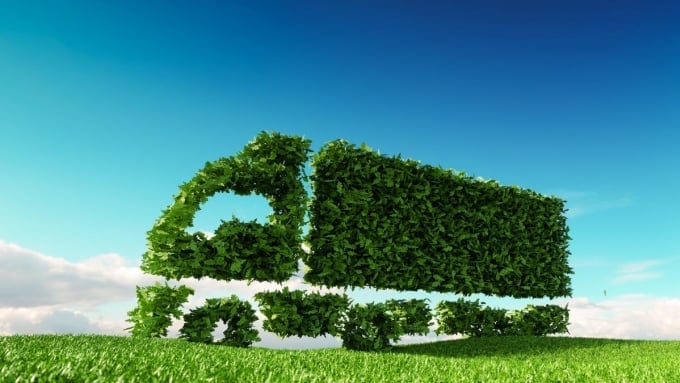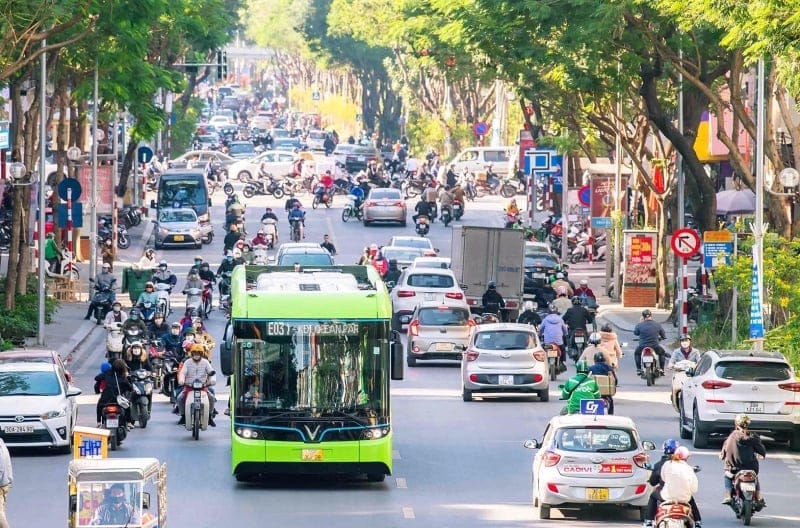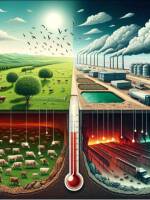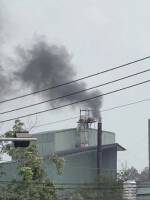
Two pathways for transportation carbon credits
According to reports from the transportation sector, greenhouse gas emissions reached 37 million metric tons of CO2 equivalent (CO2e) in 2020, accounting for about 9% of the national total of 420 million metric tons of CO2e. Projections show this figure could climb to 88.1 million metric tons of CO2e by 2030.
Under its Nationally Determined Contribution (NDC) to the Paris Agreement, Vietnam has committed the transportation sector to contribute to overall energy-sector emissions reductions through ten solution groups. These include enhancing energy efficiency, reducing fuel consumption in motor vehicles, shifting passenger and freight transport modes, raising the load factor of automobiles, and promoting the use of compressed natural gas (CNG), biofuels, and electric vehicles such as motorbikes, cars, and buses.
In 2022, the Prime Minister issued Decision 876/QD-TTg, an action program for the green energy transition and the reduction of carbon and methane emissions in transportation. The program sets a course for sustainable development, aiming for net-zero greenhouse gas emissions by 2050 and a complete transition of all road and construction vehicles to electricity and green energy.
Nguyen Tuan Quang, Deputy Director of the Department of Climate Change at the Ministry of Agriculture and Environment, said that based on targets for the 2021–2030 period, the transportation sector must cut about 45.2 million metric tons of CO2e. These emission reduction activities, he noted, carry strong potential to generate carbon credits, creating a financial stream for reinvestment in sustainable transport.
Quang outlined two potential pathways for these credits. If generated under domestic methodologies, the credits will enter the local carbon market, where they can be traded with major emitters in industries such as thermal power, steel, and cement. Under the newly issued Decree 119, companies can use these credits to offset up to 30% of their greenhouse gas emission quotas.
Alternatively, credits generated from projects that comply with Article 6 of the Paris Agreement can be recognized as Internationally Transferred Mitigation Outcomes (ITMOs) and traded with other nations.
“The Ministry of Agriculture and Environment is actively coordinating with other ministries and agencies to raise standards for gasoline vehicles, finalize regulations for electric vehicles, and build the legal framework for the carbon market and the transfer of ITMOs under Article 6,” Quang emphasized. “The objective is to create market-based economic incentives for businesses and citizens to switch to green transportation”.
Decision 876/QD-TTg requires that beginning in 2025, all new or replacement buses run on electricity or green energy. By 2050, the entire bus and taxi fleet is targeted to be zero-emission.

A filter for green fuel standards
In a recently published research report, Impact of Transport Electrification on Air Pollution and NDC Implementation in Vietnam, the Institute of Strategy and Policy on Agriculture and Environment noted that achieving greenhouse gas reduction targets will require nearly USD 370 billion in investment to decarbonize transportation. These funds are intended for building new infrastructure and restructuring the system toward a greener model, including electric vehicle networks, charging stations, sustainable public transport systems, and technology upgrades for existing transport methods.
To reduce pressure on public finances, the carbon market is expected to open a viable financing channel for green transport. The institute recommends Vietnam study the successful Low Carbon Fuel Standard (LCFS) and dual-credit systems, Corporate Average Fuel Economy (CAFE) and New Energy Vehicle (NEV) credits, implemented in California and now adopted in the EU, China, Japan, South Korea, Canada, Australia, and New Zealand. These could form the basis of promising new products for Vietnam’s carbon market.
The LCFS synchronizes greenhouse gas and fuel economy standards across the automotive industry. Producers or importers of fuels with emission intensity below the standard receive credits, while those above must buy credits to cover the deficit. This mechanism is technology-neutral, encouraging any solution that reduces emissions per unit of energy.
Meanwhile, the dual-credit policy assigns a point system for each vehicle model. Manufacturers who fail to meet the standards must either purchase credits or pay fines, pushing them to invest in battery research, improve electric motor efficiency, and increase the share of zero-emission vehicles in their product line.
California’s EV credits are defined within the LCFS electricity appendix. Charging service providers must register their infrastructure, report the electricity dispensed, and verify its power source. Renewable energy use generates higher-value credits. The policy allows for credit transfers between charging providers and fossil fuel suppliers, creating a stable revenue stream for EV infrastructure investors and shortening payback periods.
Associate Professor Dr. Nguyen Dinh Tho, Director General of the Institute of Strategy and Policy on Agriculture and Environment (ISPAE), said Vietnam’s EV credit system could follow this international framework and become a central pillar of transport-sector emissions reduction. Charging station investors would gain a secondary revenue stream through EV credits, while EV manufacturers could earn preferential access to credits by meeting emission thresholds in production, from battery manufacturing to vehicle assembly. Projects using renewable energy for public charging stations could also qualify under Article 6 of the Paris Agreement.
Vietnam could pilot the system in major cities such as Hanoi, Ho Chi Minh City, Hai Phong, Can Tho, Da Nang, and Hue. Each charging station would be registered with a unique identifier, synchronized with electricity transmission data, and updated on the national carbon registry. The initial focus would be on high-emission areas like city centers, industrial zones, bus stations, and logistics hubs.
Vietnam has seen remarkable growth in EV adoption between 2020 and 2024, with a nearly 560-fold increase, largely in the two-wheeled segment.
The electric car segment, though still in its infancy, holds vast potential. In 2024, electric car sales rose 11-fold compared to 2022. Expanding charging infrastructure is viewed as the decisive factor for EVs to account for more than 90% of total car sales between 2036 and 2050.
Khanh Ly – Translated by Linh Linh




